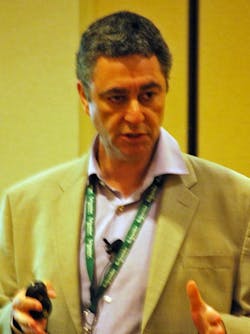[embed width="80" height="90" class="left" thumbnail="http://www.controldesign.com/assets/images/voices/bacidore.jpg?r=58297"]http://www.controldesign.com/assets/images/voices/bacidore.jpg[/embed]Mike Bacidore is the editor in chief for Control Design magazine. He is an award-winning columnist, earning a Gold Regional Award and a Silver National Award from the American Society of Business Publication Editors. Email him at [email protected].
Bonomo and Erhard Bartl, PlantStruxure roadmap director, delivered an update on the integration of the Modicon PAC series controllers into its PlantStruxure PES architecture, and how it impacts the ability of integrators and users to program, control and enable secure IIoT initiatives at Schneider Electric’s CONNECT 2016 conference this week in New Orleans.
“We see IIoT as an evolution, not a revolution,” explained Bonomo. “We started this journey a long time ago with intelligent architecture. We have the opportunity to mix power and process in the same architecture. System integrators and process OEMs want to adopt standards to reduce risks. End users want to increase efficiency, operations and profit.” The new PlantStruxure PES version is designed to meet all of these needs.
“We are always looking to satisfy our customers—the end users who run the plants, but also those who put these processes in place, meaning the system integrators and the process OEMs,” explained Bartl. “PlantStruxure PES provides users with greater information transparency, efficiency, redundancy and flexibility to make operations more efficient,” said Bartl. “It’s tested, validated and documented architecture to reduce risk.”
“The architecture needs to transform to something flatter, where each device has the ability to make decisions and make changes in real time.” Schneider Electric’s José Bonomo explained how PlantStruxure PES is ready for the road ahead at CONNECT 2016.
PlantStruxure PES V4.2 now integrates the company’s Modicon M580 ePAC family. Built for IIoT applications, the addition of Modicon M580 redundant controllers help to increase plant and asset availability. Today, 50% of PlantStruxure PES projects require at least one pair of redundant controllers within the configuration, said Bonomo. “PES V4.2 is designed to meet the next generation of requirements with the M580 ePAC.”PlantStruxure PES V4.2 now includes the full range of Modicon M340 and M580 PACs, Modicon Premium and Quantum PLCs, X80 I/O and STB distributed I/O, as well as available tools and libraries. Further, it is equipped with ready-to-use application and industry libraries, allowing systems to be built more quickly and with lower engineering costs. And by integrating energy-management features from other Schneider Electric automation and power devices, such as Altivar drives, the system will help users realize higher energy cost savings.
“PlantStruxure PES is built utilizing Modicon controllers,” explained Bartl. “It has libraries, object models, navigation services for maintenance and energy-consumption measurement and management.”
To simplify, protect and optimize
“We’ve seen the trends, and our strategy is to demonstrate the value of automation under three domains—simplify, protect and optimize,” said Bonomo. “We are putting a lot of effort into simplifying our offers. We have launched a builder across the entire lifecycle. We want to bring simplification to you as an end user, process OEM or system integrator. Then we want to protect our customers’ investments, and we want to help customers to make the most effective use of their investments, to optimize.”
One of the major drivers in designing the PlantStruxure roadmap was simplification of architecture management, added Bartl. “You design, configure, program and deploy, and then it can monitor to enable diagnosing and repair. This is lifecycle-oriented architecture management.”
The road ahead
“In 1990, automation architecture was very vertical,” said Bonomo. “Profit reporting was based on historical data. By 2020, the world will have changed. You will need to make changes and make business decisions faster. The architecture needs to transform to something flatter, where each device has the ability to make the decision and make changes in real time and not rely on an additional layer. This means improved real-time safety and security and control. We are merging the information and operational technology worlds, and we are making the architectures autonomous.”
“We are adding features to the Modicon M580 ePAC, moving toward a scalable, cybersecure platform,” explained Bartl. “We want to be able to connect to what the customer has already invested in. The range is from stand-alone to redundant. We can connect to the S908 remote I/O installed base.”
About the Author
Mike Bacidore
editor in chief

Leaders relevant to this article:



